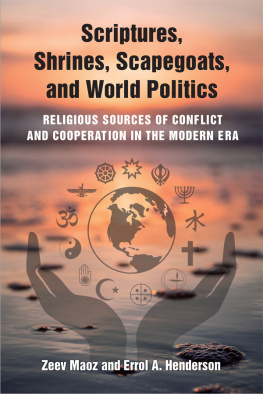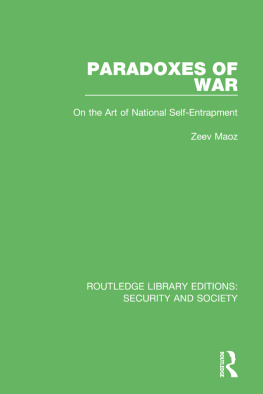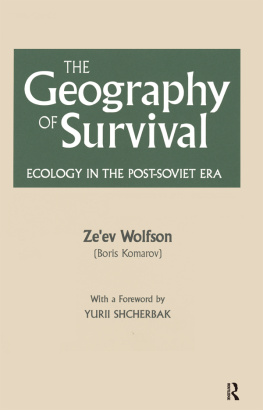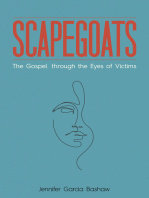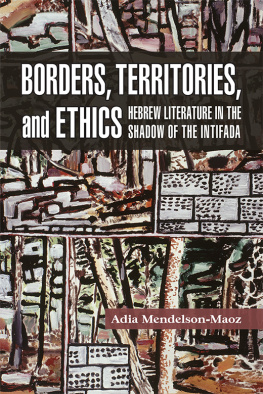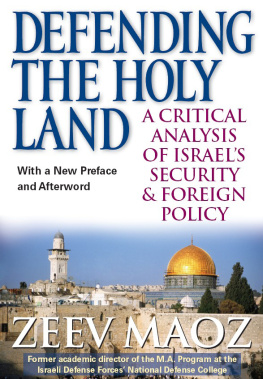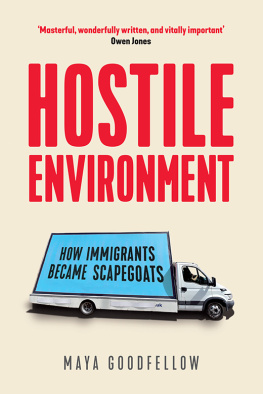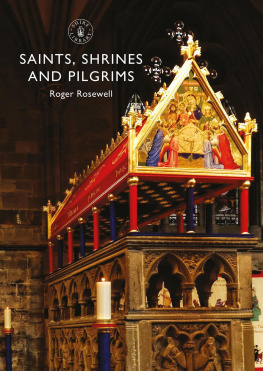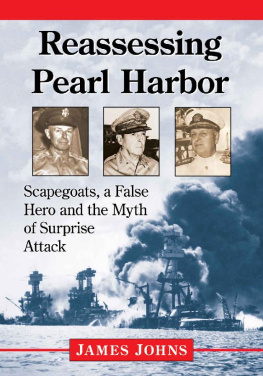Zeev Maoz - Scriptures, Shrines, Scapegoats, and World Politics
Here you can read online Zeev Maoz - Scriptures, Shrines, Scapegoats, and World Politics full text of the book (entire story) in english for free. Download pdf and epub, get meaning, cover and reviews about this ebook. year: 2020, publisher: University of Michigan Press, genre: Religion. Description of the work, (preface) as well as reviews are available. Best literature library LitArk.com created for fans of good reading and offers a wide selection of genres:
Romance novel
Science fiction
Adventure
Detective
Science
History
Home and family
Prose
Art
Politics
Computer
Non-fiction
Religion
Business
Children
Humor
Choose a favorite category and find really read worthwhile books. Enjoy immersion in the world of imagination, feel the emotions of the characters or learn something new for yourself, make an fascinating discovery.
- Book:Scriptures, Shrines, Scapegoats, and World Politics
- Author:
- Publisher:University of Michigan Press
- Genre:
- Year:2020
- Rating:5 / 5
- Favourites:Add to favourites
- Your mark:
- 100
- 1
- 2
- 3
- 4
- 5
Scriptures, Shrines, Scapegoats, and World Politics: summary, description and annotation
We offer to read an annotation, description, summary or preface (depends on what the author of the book "Scriptures, Shrines, Scapegoats, and World Politics" wrote himself). If you haven't found the necessary information about the book — write in the comments, we will try to find it.
Zeev Maoz: author's other books
Who wrote Scriptures, Shrines, Scapegoats, and World Politics? Find out the surname, the name of the author of the book and a list of all author's works by series.
Scriptures, Shrines, Scapegoats, and World Politics — read online for free the complete book (whole text) full work
Below is the text of the book, divided by pages. System saving the place of the last page read, allows you to conveniently read the book "Scriptures, Shrines, Scapegoats, and World Politics" online for free, without having to search again every time where you left off. Put a bookmark, and you can go to the page where you finished reading at any time.
Font size:
Interval:
Bookmark:

The effect of religious factors on politics has emerged as a key issue in political inquiries since the end of the Cold War and the rise of religious terrorism. However, much of the work on these matters is inconclusive, marred by controversies and polemics. The systematic investigations of these topics have been partial, focusing primarily on the effects of religious factors ondomestic and internationalconflict. Scriptures, Shrines, Scapegoats, and World Politics offers a comprehensive evaluation of the role of religion in world politics, broadening the scope of investigation to such topics as the relationship between religion and international cooperation, international conflict, civil war and the quality of life. Zeev Maoz and Errol A. Henderson argue that religion is often manipulated by leaders to advance their political interests. They find that no specific religion is either consistently more bellicose or consistently more cooperative than other religions. However, religious similarity between states tends to decrease the propensity of conflict and increase the propensity for security cooperation. Finally, the authors find a significant relationship between secularism and human security.
Zeev Maoz is Distinguished Professor of Political Science at the University of California, Davis and Director of the Correlates of War Project.
Errol A. Henderson is Associate Professor of Political Science at Pennsylvania State University. i | ii
Zeev Maoz and Errol A. Henderson
University of Michigan Press
Ann Arbor
iii | iv Copyright 2020 by Zeev Maoz and Errol A. Henderson
Some rights reserved

This work is licensed under a Creative Commons Attribution-NonCommercial-NoDerivatives 4.0 International License. Note to users: A Creative Commons license is only valid when it is applied by the person or entity that holds rights to the licensed work. Works may contain components (e.g., photographs, illustrations, or quotations) to which the rightsholder in the work cannot apply the license. It is ultimately your responsibility to independently evaluate the copyright status of any work or component part of a work you use, in light of your intended use. To view a copy of this license, visit http://creativecommons.org/licenses/by-nc-nd/4.0/
Published in the United States of America by the
University of Michigan Press
Manufactured in the United States of America
Printed on acid-free paper
First published March 2020
A CIP catalog record for this book is available from the British Library.
Library of Congress Cataloging-in-Publication data has been applied for .
ISBN 978-0-472-13174-7 (hardcover : alk. paper)
ISBN 978-0-472-12643-9 (e-book)
ISBN 978-0-472-90123-4 (OA)
http://dx.doi.org/10.3998/mpub.11353856
This book is freely available in an open access edition thanks to TOME (Toward an Open Monograph Ecosystem)a collaboration of the Association of American Universities, the Association of University Presses, and the Association of Research Librariesand the generous support of the University of California, Davis, and the Pennsylvania State University. Learn more at the TOME website, available at: openmonographs.org.
Religion is one of the most persistent resins that forms and maintains communal bonds. Almost all recorded historical sourcesanthropological, archaeological, textual or oraldocument this fact. It is also an important force defining intercommunal interaction since the dawn of recorded history. Yet, until quite recently, most mainstream students of world politics did not pay much attention to the role of religion in conflict and cooperation, explicitly. Just when religious factors seemed to play a smaller role in political and social affairswith growing numbers of secular people and more states practicing separation between religion and governmentmainstream scholars of world politics began to focus on the interplay between religion and international relations.
We have some ideas about this peculiar piece of intellectual history, which we discuss in the first chapter. Notably, however, the surge in studies on religion and world politics started in the early 1990s, just after the end of the Cold War. Since then, a number of important theories have emerged connecting different aspects of religion to conflict and cooperationbetween and within nationsand focusing on religions impact explicitly or implicitly. Several of the hypotheses stemming from such theories have been subjected to rigorous empirical analyses. The results, however, are inconclusive at best. Some theories linking religion to conflict and cooperation have received empirical support; others have not. Yet, neither the supportive nor the disconfirming evidence is sufficiently robust to allow unequivocal assessment of the validity of these theories. Moreover, most studies of religion and world politics are partial and scattered. The studies focusing on the linkages between religion and international conflict have ignored the relations between religion and international cooperation and vice versa. Other studies have focused on the domestic political implications v | vi of religion, e.g., its effect on civil conflict, political stability, and democracy. While all these studies offer interestingif inconclusiveinsights, we still lack a comprehensive account of the overall role of religion in world politics. The present study offers such an account.
Utilizing a new and comprehensive dataset on world religions, we study the effect of religion on (a) international conflict, (b) international cooperation, (c) domestic conflict, and (d) human security and welfare. These analyses combine to form a more general understanding of the role religion has played in world politics since the end of World War II. They also enable us to examine the implications of these results for the future of the international system.
Our approach is more extensive than most studies on the subject in several important respects. First, we examine the effect of religion on politics among and within nations. We also examine how religion influences the interaction between domestic and international politics. Second, most studies focus on a single unit of analysiseither the individual state or the dyad (i.e., pair of states)whereas we examine the interrelations between religion and politics across multiple levels of analysis. We focus on individual states, pairs of states, groups of states and regions, and the international system as a whole. This enables us to reach far more generalizable conclusions than most previous studies on the subject.
Third, we focus on a far wider array of behaviors than most previous studies. Again, this leads to broader and more reliable generalizations. Finally, the scope of our empirical analyses is considerably wider, and methodologically more innovative than most studies on the subject. This makes our results much more robust than previous investigations. We not only replicate what others have done but also improve and expand on the theoretical treatment of these topics, offer higher-resolution data, and improve on the methods and analyses linking religion to world politics. In short, this is possibly the most comprehensive empirical study of its kind.
Font size:
Interval:
Bookmark:
Similar books «Scriptures, Shrines, Scapegoats, and World Politics»
Look at similar books to Scriptures, Shrines, Scapegoats, and World Politics. We have selected literature similar in name and meaning in the hope of providing readers with more options to find new, interesting, not yet read works.
Discussion, reviews of the book Scriptures, Shrines, Scapegoats, and World Politics and just readers' own opinions. Leave your comments, write what you think about the work, its meaning or the main characters. Specify what exactly you liked and what you didn't like, and why you think so.

